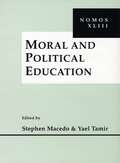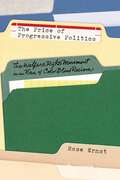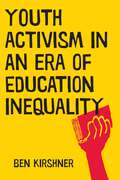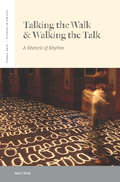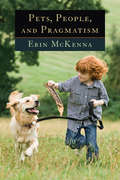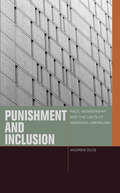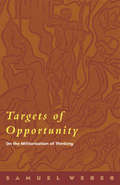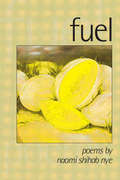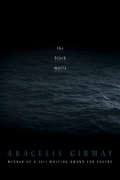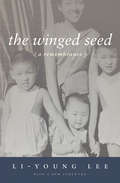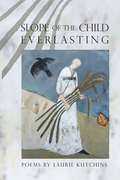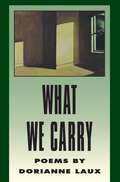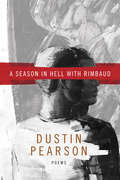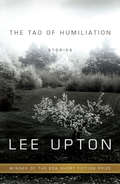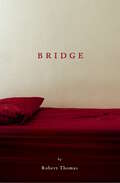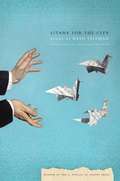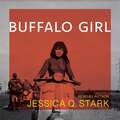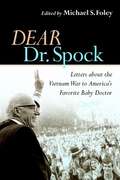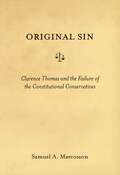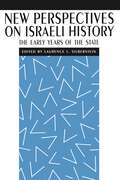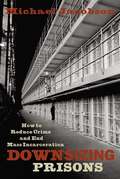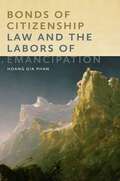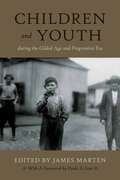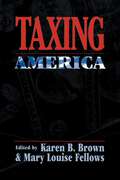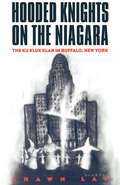- Table View
- List View
Moral and Political Education: NOMOS XLIII (NOMOS - American Society for Political and Legal Philosophy #13)
by Stephen Macedo and Yael TamirWhat are the proper aims of education in a liberal democracy? Given the deep disagreement about moral and religious values in modern societies, what is the proper balance between public and private claimants to educational authority? Should parents be given greater control over their children's formal education? Are today's public schools promoting a culture of rootless individualism? Do we increasingly resort to prisons and punishment instead of schooling and moral education to control young people? And what, finally, should be the fate of the great project of racially integrated schooling: a project that energized a vast expenditure of hopes and resources in the latter half of the 20th century in America? Should we recommit ourselves to the ideal of integration, or should we embrace other, perhaps better, ways to help the disadvantaged and promote social integration? Should we go further, and affirm that predominantly black educational institutions have intrinsic benefits, such as preserving black culture and providing role models for black youngsters? As education reform takes center stage these questions are at the heart of what it means to be an American and participate in a democratic society. The essayists in this volume bring philosophical, political, and legal reflection to bear on the practical questions of how education should be changed to meet the needs of the twenty-first century. In so doing they display a determination to illuminate the educational choices that lie before all modern democracies. Contributors: Anita L. Allen, Lawrence Blum, Harry Brighouse, Randall Curren, Peter de Marneffe, James G. Dwyer, Christopher Eisgruber, William A. Galston, Amy Gutmann, Michael W. McConnell, Rob Reich, Nancy L. Rosenblum, Yael Tamir, John Tomasi, and Andrew Valls.
The Price of Progressive Politics: The Welfare Rights Movement in an Era of Colorblind Racism
by Rose ErnstThrough the voices of women activists in the welfare rightsmovement across the United States, The Price of ProgressivePolitics exposes the contemporary reality of welfare rightspolitics, revealing how the language of colorblind racism underminesthis multiracial movement. Through in-depth interviewswith activists in eight organizations across the UnitedStates, Rose Ernst presents an intersectional analysis of howthese activists understand the complexities of race, classand gender and how such understandings have affectedtheir approach to their grassroots work. Engaging and accessible,The Price of Progressive Politics offers a refreshingexamination of how those working for change grapple withshifting racial dynamics in the United States, arguing thatorganizations that fail to develop a consciousness that reflectsthe reality of multiple marginalized identities ultimatelyreproduce the societal dynamics they seek to change.
Youth Activism in an Era of Education Inequality (Qualitative Studies in Psychology #2)
by Ben KirshnerWinner, 2016 Best Authored Book presented by the Society for Research on AdolescenceDiverse case studies on how youth build political power during an era of racial and educational inequality in AmericaThis is what democracy looks like: Youth organizers in Colorado negotiate new school discipline policies to end the school to jail track. Latino and African American students march to district headquarters to protest high school closure. Young immigration rights activists persuade state legislators to pass a bill to make in-state tuition available to undocumented state residents. Students in an ESL class collect survey data revealing the prevalence of racism and xenophobia. These examples, based on ten years of research by youth development scholar Ben Kirshner, show young people building political power during an era of racial inequality, diminished educational opportunity, and an atrophied public square. The book’s case studies analyze what these experiences mean for young people and why they are good for democracy. What is youth activism and how does it contribute to youth development? How might collective movements of young people expand educational opportunity and participatory democracy? The interdependent relationship between youths’ political engagement, their personal development, and democratic renewal is the central focus of this book. Kirshner argues that youth and societal institutions are strengthened when young people, particularly those most disadvantaged by educational inequity, turn their critical gaze to education systems and participate in efforts to improve them.
Talking the Walk & Walking the Talk: A Rhetoric of Rhythm (Verbal Arts: Studies in Poetics)
by Marc ShellThis book argues that we should regard walking and talking in a single rhythmic vision. In doing so, it contributes to the theory of prosody, our understanding of respiration and looking, and, in sum, to the particular links, across the board, between the human characteristics of bipedal walking and meaningful talk.The author first introduces the philosophical, neurological, anthropological, and aesthetic aspects of the subject in historical perspective, then focuses on rhetoric and introduces a tension between the small and large issues of rhythm. He thereupon turns his attention to the roles of breathing in poetry—as a life-and-death matter, with attention to beats and walking poems. This opens onto technical concepts from the classical traditions of rhetoric and philology.Turning to the relationship between prosody and motion, he considers both animals and human beings as both ostensibly able-bodied creatures and presumptively disabled ones. Finally, he looks at dancing and writing as aspects of walking and talking, with special attention to motion in Arabic and Chinese calligraphy.The final chapters of the book provide a series of interrelated representative case studies.
Pets, People, and Pragmatism (American Philosophy)
by Erin McKennaPets, People, and Pragmatism examines human relationships with pets without assuming that such relations are either benign or unnatural and to be avoided. The book addresses a lack of respect in pet–people relationships; for respectful relationships to be a real possibility, however, humans must make the effort to understand the beings with which we live, work, and play.American pragmatism understands that humans and other animal beings have been interacting and transforming each other for thousands of years. There is nothing “unnatural” about the human domestication of other animal beings, though domestication does raise specific practical and ethical questions. A pragmatist account of our relationship with those animal beings commonly considered as pets does not prohibit the use of these beings in research, entertainment, competition, or work. It does, however, find abuse and neglect ethical.Because abuse can occur in any use of other animal beings, this pragmatist account takes up the abusive practices in research, entertainment, competition, and work without arguing that these practices are inherently abusive. Some of the sources of abuse have been addressed by utilitarian and deontological accounts, but a pragmatist evolutionary perspective offers unique insights and results in some surprising conclusions: For instance, there may be an ethical obligation to let a horse race, a dog show, or a cat compete in agility.Pets, People, and Pragmatism embarks on a philosophical journey that will captivate scholars and pet enthusiasts alike. It provides an important contribution to longstanding debates in the area of animal issues and strengthens the idea of multiple approaches to nonhuman beings. It also opens space for approaches that challenge some of the assumptions in the field of philosophy that have resulted in a dualistic and hierarchical approach to metaphysics and ethics.
Punishment and Inclusion: Race, Membership, and the Limits of American Liberalism (Just Ideas)
by Andrew DiltsAt the start of the twenty-first century, 1 percent of the U.S. population is behind bars. An additional 3 percent is on parole or probation. In all but two states, incarcerated felons cannot vote, and in three states felon disenfranchisement is for life. More than 5 million adult Americans cannot vote because of a felony-class criminal conviction, meaning that more than 2 percent of otherwise eligible voters are stripped of their political rights. Nationally, fully a third of the disenfranchised are African American, effectively disenfranchising 8 percent of all African Americans in the United States. In Alabama, Kentucky, and Florida, one in every five adult African Americans cannot vote.Punishment and Inclusion gives a theoretical and historical account of this pernicious practice of felon disenfranchisement, drawing widely on early modern political philosophy, continental and postcolonial political thought, critical race theory, feminist philosophy, disability theory, critical legal studies, and archival research into state constitutional conventions. It demonstrates that the history of felon disenfranchisement, rooted in postslavery restrictions on suffrage and the contemporaneous emergence of the modern “American” penal system, reveals the deep connections between two political institutions often thought to be separate, showing the work of membership done by the criminal punishment system and the work of punishment done by the electoral franchise.Felon disenfranchisement is a symptom of the tension that persists in democratic politics between membership and punishment. This book shows how this tension is managed via the persistence of white supremacy in contemporary regimes of punishment and governance.
Targets of Opportunity: On the Militarization of Thinking
by Samuel WeberThe title of this book echoes a phrase used by the Washington Post to describethe American attempt to kill Saddam Hussein at the start of the war againstIraq. Its theme is the notion of targeting (skopos) as the name of an intentionalstructure in which the subject tries to confirm its invulnerability by aiming todestroy a target. At the center of the first chapter is Odysseus’s killing of the suitors;the second concerns Carl Schmitt’s Roman Catholicism and Political Form; thethird and fourth treat Freud’s “Thoughts for the Times on War and Death” and“The Man Moses and Monotheistic Religion.” Weber then traces the emergenceof an alternative to targeting, first within military and strategic thinking itself(“Network Centered Warfare”), and then in Walter Benjamin’s readings of“Capitalism as Religion” and “Two Poems of Friedrich Hölderlin.”
Fuel (American Poets Continuum)
by Naomi Shihab NyeNaomi Shihab Nye focuses on ordinary people and ordinary situations, which, when rendered through the poems in Fuel, become remarkable. The poet imagines the border families of southern Texas, small ferns and forgotten books, Jews and Palestinians in the Middle East. Nye has written, "Lives unlike mine, you save me."
the black maria
by Aracelis GirmayTaking its name from the moon's dark plains, misidentified as seas by early astronomers, The Black Maria investigates African diasporic histories, the consequences of racism within American culture, and the question of human identity. Central to this project is a desire to recognize the lives of Eritrean refugees who have been made invisible by years of immigration crisis, refugee status, exile, and resulting statelessness. The recipient of a 2015 Whiting Award for Poetry, Girmay's newest collection elegizes and celebrates life, while wrestling with the humanistic notion of seeing beyond: seeing violence, seeing grace, and seeing each other better."to the sea"great storage house, historyon which we rode, we touchedthe brief pulse of your flutteringpages, spelled with salt & life,your rage, your indifferenceyour gentleness washing our feet,all of you going onwhether or not we live,to you we bring our carnationsyellow & pink, how they floatlike bright sentences atopyour memory's dark hairAracelis Girmay is the author of two poetry collections, Teeth and Kingdom Animalia, which won the Isabella Gardner Award and was a finalist for the NBCC Award. The recipient of a 2015 Whiting Award, she has received grants and fellowships from the Jerome, Cave Canem, and Watson foundations, as well as Civitella Ranieri and the NEA. She currently teaches at Hampshire College's School for Interdisciplinary Arts and in Drew University's low residency MFA program. Originally from Santa Ana, California, she splits her time between New York and Amherst, Massachusetts.
The Winged Seed: A Remembrance (American Readers Series)
by Li-Young Lee"It has true spiritual importance for contemporary American literature."-Edward HirschUpon its initial publication, acclaimed poet Li-Young Lee's memoir The Winged Seed: A Remembrance (1995), received an American Book Award from the Before Columbus Foundation. In lyrical prose, Lee's extraordinary story begins in the 1950s when his parents fled China's political turmoil for Indonesia. Along with many other Chinese members of the population, his family was persecuted under President Sukarno. Falsely accused and charged for crimes against the state, his father spent a year and a half in jail as a political prisoner, half of that time in a leper colony. While his entire family was being transported to a prison colony, they escaped and fled to Hong Kong, Japan, Malaysia, and back to Hong Kong where his father rose to prominence as an evangelical preacher. Eventually, the family sought asylum in the United States in 1962. When the author was six, they emigrated to a small town in western Pennsylvania where his father became a Presbyterian minister. This reissued edition contains a new foreword by the author and never-before-seen photos of the family from different stages of their journey.Li-Young Lee is the author of four critically acclaimed books of poetry that have garnered such awards as the Delmore Schwartz Memorial Award from New York University; the 1990 Lamont Poetry Selection; the Writer's Award from the Mrs. Giles Whiting Foundation; and fellowships from the National Endowment for the Arts, The Lannan Foundation, and the John Simon Guggenheim Memorial Foundation.
Slope of the Child Everlasting (American Poets Continuum)
by Laurie KutchinsSlope of the Child Everlasting sustains the lyric and imagistic sensibility of Laurie Kutchins’ previous poetry collection, The Night Path (BOA Editions, 1997), while expanding on its exploration of the archetypes that anchor the heart and mind of her poetry. The characters in these poems evoke chaos and regression, as well as song, wonder, and the tenacity of the imagination. Laurie Kutchins is an associate professor of English at James Madison University in Virginia. She lives in Harrisonburg, Virginia, and spends her summers along the Wyoming-Idaho border. The Night Path won the 1997 Isabella Gardner Award from BOA Editions.
What We Carry (American Poets Continuum #Vol. 28)
by Dorianne LauxFinalist, 1994 National Book Critics Circle Award for Poetry. Dorianne Laux's poetry is a poetry of risk; it goes to the very edge of extinction to find the hard facts that need to be sung. What We Carry includes poems of survival, poems of healing, poems of affirmation and poems of celebration.
A Season in Hell with Rimbaud (American Poets Continuum Series #193)
by Dustin Kyle PearsonIn pursuit of his brother, a man traverses the fantastical and grotesque landscape of Hell, pondering their now fractured relationship. The poems in Dustin Pearson’s A Season in Hell with Rimbaud form an allegorical travelogue that chronicles two brothers’ mutual descent into hell. When the older brother runs off by himself, the younger brother begins roaming Hell’s different landscapes in search of him. As he searches, the younger brother ruminates on their now fractured relationship: what brought them here? Can they find each other? Will their bonds ever be repaired? In the tradition of Virgil, Dante, Milton, Swift, Shelley, Joyce, Sarte, and especially Arthur Rimbaud, Pearson leads his speakers on a speculative, epistolary journey through the nether realm inspired by Christian beliefs and tradition. Drawing on the works of French Symbolists and the literary traditions of the American South, A Season in Hell with Rimbaud guides readers through an intimate rendering of one brother’s journey to find his lost and estranged brother, perhaps recovering a part of himself in the process.
The Tao of Humiliation (American Readers Series)
by Lee UptonAlternately chilling, funny, devastating, and hopeful, these twenty stories introduce us to a theater critic who winds up in a hot tub with the actress he routinely savages in reviews; a biographer who struggles to discover why a novelist stopped writing; a woman who searches through her past lives to recall a romantic encounter with the poet W. B. Yeats; a student who contends with her predatory professor; and the poignant scenario of the last satyr meeting his last woman.Writer-in-residence and a professor of English at Lafayette College, Lee Upton is author of twelve books of fiction, nonfiction, and poetry.
Bridge: A Bridge To Decision Making (American Writers Ser. #No. 5)
by Robert ThomasBridge is a collection of linked-stories about a troubled young woman?Alice?who works at a San Francisco law firm. Alice goes through despair and occasional rapture as she struggles with simultaneously real and hallucinated relationships with her co-worker David (of the romantic variety) and her supervisor Fran. Passionate, whip-smart, furious, and perceptive, Alice contemplates both suicide and murder as she struggles to find meaning in the day-to-day interactions of her life.Robert Thomas holds an MFA from Warren Wilson College. He lives in Oakland, California, and works as a legal secretary in San Francisco.
Litany for the City
by Ryan TeitmanSelected by Jane Hirshfield from over six hundred manuscripts, Litany for the City is the winner of the tenth annual A. Poulin, Jr. Poetry Prize. Of Litany for the City, Hirshfield writes, "This book carries both startling imaginative freedoms and the impulsion of a person navigating the terrain of his life by means of the star-chart and sextant of poems--a winning combination, for me."Ryan Teitman is a Wallace Stegner Fellow in Poetry at Stanford University. He holds an MA and MFA from Indiana University. He currently lives in Berkeley, California.
Buffalo Girl (American Poets Continuum Series #199)
by Jessica Q. StarkIn these hybrid poems, Jessica Q. Stark explores her mother’s fraught immigration to the United States from Vietnam at the end of war through the lens of the Little Red Riding Hood fairy tale.Told through personal, national, and cultural histories, Buffalo Girl is a feminist indictment of the violence used to define and control women's bodies. Interspersed throughout this hybrid work are a series of collaged photographs, featuring Stark’s mother’s black-and-white photography from Vietnam beautifully and hauntingly layered over various natural landscapes — lush tropical plants, dense forests, pockets of wildflowers. Several illustrations from old Red Riding Hood children’s books can also be found embedded into these pieces. Juxtaposing the moral implications of Little Red Riding Hood with her mother's photography, Stark creates an image-text conversation that attends to the wolves lurking in the forests of our everyday lives. Opening the whispered frames around sexuality and sex work, immersed in the unflattering symptoms of survival, Buffalo Girl burgeons with matrilineal love and corporeal rage while censuring the white gaze and the violence enacted through the English language. Here is an inversion of diasporic victimhood. Here is an unwavering attention to the burdens suffered by the women of this world. Here is a reimagination, a reclamation, a way out of the woods.
Dear Dr. Spock: Letters about the Vietnam War to America's Favorite Baby Doctor
by Michael S. FoleyAt the height of the Vietnam War, thousands of Americans wrote moving letters to Dr. Benjamin Spock, America’s pediatrician and a high-profile opponent of the war. Personal and heartfelt, thoughtful and volatile, these missives from Middle America provide an intriguing glimpse into the conflicts that took place over the dinner table as people wrestled with this divisive war and with their consciences.Providing one of the first clear views of the home front during the war, Dear Dr. Spock collects the best of these letters and offers a window into the minds of ordinary Americans. They wrote to Spock because he was familiar, trustworthy, and controversial. His book Baby and Child Care was on the shelves of most homes, second only to the Bible in the number of copies sold. Starting in the 1960s, his activism in the antinuclear and antiwar movements drew mixed reactions from Americans—some puzzled, some supportive, some angry, and some desperate.Most of the letters come from what Richard Nixon called the “silent majority”—white, middleclass, law-abiding citizens who the president thought supported the war to contain Communism. In fact, the letters reveal a complexity of reasoning and feeling that moves far beyond the opinion polls at the time. One mother of young children struggles to imagine how Vietnamese women could endure after their village was napalmed, while another chastises Spock for the “dark shadow” he had cast on the country and pledges to instill love of country in her sons.What emerges is a portrait of articulate Americans struggling mightily to understand government policies in Vietnam and how those policies did or did not reflect their own sense of themselves and their country.
Original Sin: Clarence Thomas and the Failure of the Constitutional Conservatives (Critical America #33)
by Samuel A. MarcossonOriginalism is the practice of reviewing constitutional cases by seeking to discern the framers' and ratifiers' intent. Original Sin argues that the "jurisprudence of original intent," represented on the current Supreme Court by Justices Antonin Scalia and Clarence Thomas, has failed on its own terms. Attempts to determine the framers' intent have not brought greater determinacy and legitimacy to the process of constitutional interpretation. Instead, the method has been marked by the very flaws—including self-interested reasoning and the manipulation of doctrine—that originalists argue marred the jurisprudence of the judicial "activists" of the Warren Court. Original Sin brings a rigorous review of the performance of the "new originalists" to the debate, applying their methodology to real cases. Marcosson focuses on the judicial decisions of Clarence Thomas, an avowed originalist who nevertheless advocates "color blind" readings of the Constitution which are at odds with the framers' ideas concerning anti-miscegenation and other laws. After critiquing what he sees as a troubling use of originalism and explaining why it has failed to provide a consistent basis for constitutional decision-making, the author goes on to offer an alternative approach: one that lends greater legitimacy to the Court's interpretations of the Constitution.
New Perspectives on Israeli History: The Early Years of the State (New Perspectives on Jewish Studies #5)
by Laurence J. SilbersteinIn this volume a distinguished group of international scholars draws from history, folklore, political anthropology, historiography, and cultural criticism to reexamine critical issues surrounding the birth of Israel. The authors explore such issues as the transition form yishuv to state, early state policy toward the Arab minority, the origins of the Palestinian refugee problem, the conflict over myths and symbols in the early state, early attitude toward Holocaust victims and survivors, Arab historiography of the 1948 war, Israel-Diaspora relations, and the shaping of Israeli foreign policy.The contributors to the book include: Myron J. Aronoff (Rutgers University), Uri Bialer (Hebrew University of Jerusalem), Neil Caplan (Vanier College, Montreal), Benny Morris(Hebrew Univeristy of Jerusalem), Don Peretz (State University of New York, Binghamton), Dina Porat (Tel Aviv University), Jehuda Reinharz (Brandeis University), Elie Rekhess (Tel Aviv University), Avraham Sela(Hebrew University of Jerusalem), Anton Shammas(University of Michigan), Laurence J. Silberstein (Lehigh University), Kennethy STein (Emory University), Yael Zerubavel(University of Pennsylvania), and Ronald W. Zweig (Tel Aviv University).
Downsizing Prisons: How to Reduce Crime and End Mass Incarceration
by Michael JacobsonA convincing argument that mass incarceration neither reduces crime nor ensures safetyOver two million people are incarcerated in America’s prisons and jails, eight times as many since 1975. Mandatory minimum sentencing, parole agencies intent on sending people back to prison, three-strike laws, for-profit prisons, and other changes in the legal system have contributed to this spectacular rise of the general prison population.After overseeing the largest city jail system in the country, Michael Jacobson knows first-hand the inner workings of the corrections system. In Downsizing Prisons, he convincingly argues that mass incarceration will not, as many have claimed, reduce crime nor create more public safety. Simply put, throwing away the key is not the answer.
Bonds of Citizenship: Law and the Labors of Emancipation (America and the Long 19th Century #19)
by Hoang Gia PhanIn this study of literature and law from the Constitutional founding through the Civil War, Hoang Gia Phan demonstrates how American citizenship and civic culture were profoundly transformed by the racialized material histories of free, enslaved, and indentured labor. Bonds of Citizenship illuminates the historical tensions between the legal paradigms of citizenship and contract, and in the emergence of free labor ideology in American culture.Phan argues that in the age of Emancipation the cultural attributes of free personhood became identified with the legal rights and privileges of the citizen, and that individual freedom thus became identified with the nation-state. He situates the emergence of American citizenship and the American novel within the context of Atlantic slavery and Anglo-American legal culture, placing early American texts by Hector St. John de Crèvecœur, Benjamin Franklin, and Charles Brockden Brown alongside Black Atlantic texts by Ottobah Cugoano and Olaudah Equiano. Beginning with a revisionary reading of the Constitution’s “slavery clauses,” Phan recovers indentured servitude as a transitional form of labor bondage that helped define the key terms of modern U.S. citizenship: mobility, volition, and contract. Bonds of Citizenship demonstrates how citizenship and civic culture were transformed by antebellum debates over slavery, free labor, and national Union, while analyzing the writings of Frederick Douglass and Herman Melville alongside a wide-ranging archive of lesser-known antebellum legal and literary texts in the context of changing conceptions of constitutionalism, property, and contract. Situated at the nexus of literary criticism, legal studies, and labor history, Bonds of Citizenship challenges the founding fiction of a pro-slavery Constitution central to American letters and legal culture.
Children and Youth During the Gilded Age and Progressive Era (Children and Youth in America #1)
by James MartenIn the decades after the Civil War, urbanization, industrialization, and immigration marked the start of the Gilded Age, a period of rapid economic growth but also social upheaval. Reformers responded to the social and economic chaos with a “search for order,” as famously described by historian Robert Wiebe. Most reformers agreed that one of the nation’s top priorities should be its children and youth, who, they believed, suffered more from the disorder plaguing the rapidly growing nation than any other group. Children and Youth during the Gilded Age and Progressive Era explores both nineteenth century conditions that led Progressives to their search for order and some of the solutions applied to children and youth in the context of that search. Edited by renowned scholar of children’s history James Marten, the collection of eleven essays offers case studies relevant to educational reform, child labor laws, underage marriage, and recreation for children, among others. Including important primary documents produced by children themselves, the essays in this volume foreground the role that youth played in exerting agency over their own lives and in contesting the policies that sought to protect and control them.
Taxing America (Critical America #44)
by Karen B. Brown and Mary Louise FellowsIn the winter of 1996, Steve Forbes--publisher, heir, and presidential candidate--captured the American imagination with his proposal for a flat tax. But while Mr. Forbes claimed that such a tax would level the economic playing field by eliminating countless loopholes and miles of red tape, his actual proposal betrayed such claims to fairness by overtaxing workers and undertaxing financial capital. In the face of recent proposals for dramatic and far-reaching tax reform, Taxing America takes a critical look at the way the federal government collects its revenue and exposes the bias at the heart of a system which claims to be objective and fair. Contrary to traditional tax scholarship, these writers argue that an awareness of disability discrimination, economic exploitation, heterosexism, sexism and racism is crucial to any analysis of tax policy. Gathering together essays whose topics range from federal housing policy to environmental clean-up costs to tax treaty policy making, Karen B. Brown and Mary Louise Fellows present a philosophy that is as simple as it is radical: economic arrangements contribute significantly to the creation of social hierarchies and the perpetuation of discrimination. Given this reality, Brown and Fellows maintain that the goal of the federal tax law should be social justice and the disruption of discriminatory and exploitative practices.
Hooded Knights on the Niagara: The Ku Klux Klan in Buffalo, New York
by Shawn LayThey came in the dead of night, marking the homes and businesses of their enemies with crude symbols and dire warnings. They plotted against those of other religious faiths and circulated secret lists of alleged traitors to the community and nation. They mailed anonymous threats to those who refused to be intimidated into silence, all the while claiming that they were the true champions of American justice and freedom. The above may seem an accurate description of the sinister activities that distinguished the Ku Klux Klan in the early twentieth century, but in Buffalo, New York, and, in fact, throughout much of the northeastern United States, such activities were as characteristic of the Klan's opponents as of the hooded order itself. While the revived Klan of the 1920s-- the largest and most influential manifestation of organized intolerance in American history--proceeded with relative impunity in many locales, it encountered a very different situation in Buffalo where powerful enemies opposed the organization at every turn. Shawn Lay here provides a riveting portrayal of how the Klan established itself in Buffalo. Most chillingly, he explains how otherwise ordinary, well-established citizens, caught up in a complex set of circumstances, were persuaded to join a notorious secret society that pandered to the darkest impulses in American society.
